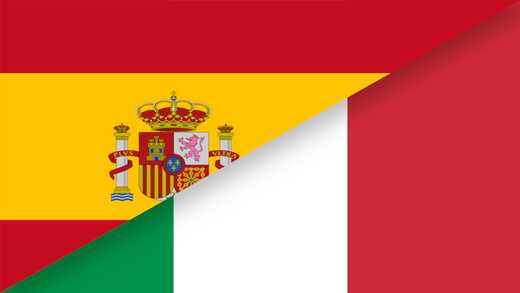Yes, Italians Can Understand Spanish Speakers (Mostly)
 Written byJada Lòpez
Written byJada Lòpez- Read time3 mins
- Comments1

Can Italians understand Spanish speakers (and vice-versa)?
The short answer is yes.
But mutual intelligibility between Spaniards and Italians requires some amount of careful adaptation to make communication easier.
This involves substituting words that the other party may not know for a word that is shared between both languages, slowing of speech and paying extra careful attention to the other person. There are going to be many slang expressions in Spanish that Italians may not understand.
The other issue is pronunciation.
Spanish sounds quite different to Italian, and this pronunciation difference may lead to confusion for both parties.
Knowing either Spanish or Italian will guarantee at least some mutual comprehension
Spanish and Italian are part of a group of languages called Romance languages, which is made up of French, Italian, Spanish, Portuguese, and Romanian.
These all evolved from Vulgar Latin over the centuries of Roman control in Europe.
Because of their shared Latin roots, the majority of the vocabulary of these languages are the same or almost the same.
While it’s true that all Romance languages are very closely related in their lexical and grammatical makeup, it is Spanish and Italian that are the most mutually intelligible.
French and Portuguese are comparatively very different.
So how close are Italian and Spanish?
Very much so. A Spaniard could, theoretically, exist happily in Italy using only Spanish.
The main challenge they would face is that various words, which may be perfectly understood in both languages, are not used in the same context in Italy.
This is very similar to the way that Moroccans use antiquated Arabic expressions that Egyptians wouldn’t use in the same context, even though it may be understandable.
Not all Spanish words carry the same meaning in Italian (and vice-versa)
Because words may carry different meanings in Italy, it’s imperative that a Spanish speaker pay close attention to what are called false friends.
These are words that look the same in both languages, but carry a different meaning.
Here are a couple of examples:
| Word | Spanish meaning | Italian meaning |
|---|---|---|
| sembrar / sembrare | to plant | to appear |
| pronto | soon | ready |
| tras / tra | behind | among |
| burro | donkey | butter |
| parar / parare | to stop | to parry |
While some false friends are vastly different in meaning, many of them have a traceable connection to their root, so it’s not all bad.
So do Italians understand spoken Spanish?
Italian and Spanish are not the same language, but they’re close enough that mutual intelligibility is possible.
Both languages have over 80% lexical overlap, with pronunciation and grammatical differences.
The answer is not that they will understand eachother, but rather that they can understand eachother (with effort). This extra effort entails careful listening and slower speaking, and may require both parties to search for alternative vocabulary.
It is entirely feasible to live and get by in Italy using only Spanish (or for an Italian to exist in Spain), though it may be stressful having to constantly adjust your speech.
At the end of the day, if you plan on residing in Italy as a Spanish speaker, you should aim to learn Italian.
 Grab the link to this article
Grab the link to this article